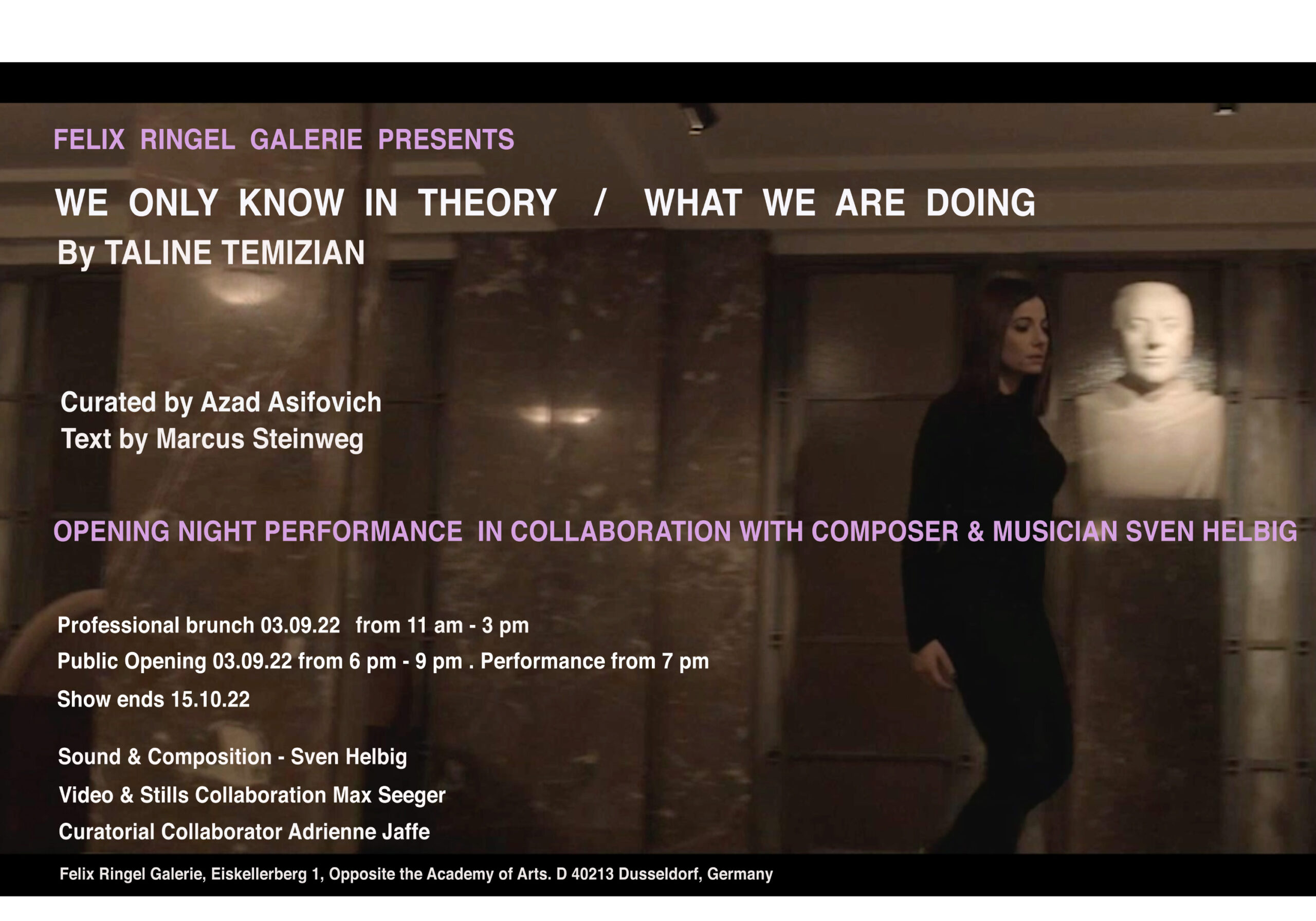
Text By Marcus Steinweg
WELTANGST
Für Taline
„Die Angst des Lebens selbst treibt den Menschen aus dem Zentrum“. Heidegger begeisterte dieser Satz aus der Freiheitsschrift Schellings, der in den Weltalter-Fragmenten die Angst als „Grundempfindung jedes lebenden Geschöpfs“ beschreibt. Jedenfalls ist der Mensch aus seinem Gottbezug gefallen. Entfernt man sich von Schelling, kommt man zu Lacan, der in seinem Seminar Die Angst von 1962/63 den Motivkreis von Angst, Begehren und Atheismus aufspannt.
Es geht um den Verlust und die Schwierigkeiten, sich mit ihm zu arrangieren. Was verloren ging, ist das Ding, das Gott bzw. Vater oder Mutter heißt = die alles im Blick behaltende Autorität, von der man behauptet, sie sei einem lästig, solange man auf ihre Präsenz und Konsistenz vertraut. Wenn das Vertrauen sich aufzulösen beginnt, schreit das Menschenkind nach seinem Kardinalreferenten. Es brüllt und heult sich geradezu eine Welt zusammen.
Welt meint hier: einen verlässlichen Zusammenhang, in dem sich angstlos leben lässt, was nichts als Einbildung bleibt. So ist das Tier, das Mensch heißt: Mitten im Staub greift es nach den Sternen. Was es weiß, will es kaum wahrhaben: Das Paradies ist längst verloren. Deshalb steht es neben sich und stiert in die Leere. Wer akzeptiert schon – unwiderruflich – verloren zu sein?
Den Atheismus konnotiert Lacan mit der Bereitschaft, „das Phantasma vom Allmächtigen zu eliminieren.“ Angst kann beides sein: Angst vor dieser Eliminierung wie ihr halsbrecherischer Vollzug. Wer Angst hat, stürzt sich in die Leere, die er flieht. Das Zentrum ist plötzlich überall. Es indiziert nichts als die Leere, der man sich panisch anvertraut. Im Vertrauen schwingt das Wissen mit, dass es unbegründet bleibt. Schließlich schwebt es über dem Abgrund der ontologischen Inkonsistenz, die sämtliche Realitäten durchzieht.
Indem Lacan den Atheismus als „Negation der Dimension einer Gegenwärtigkeit der Allmacht im Innersten der Welt“ auffasst, bereitet er den Boden für eine Theorie der Bodenlosigkeit oder Abgründigkeit, deren Vorläufer Hölderlin, Nietzsche, Wittgenstein, Heidegger, Derrida und Nancy sind. Sowohl das Präsenz- oder Gegenwärtigkeitsphantasma wie dasjenige der Allmacht, das der Innerlichkeit und das der Welt (als geordnetem Kosmos und Vertrautheits- bzw. Konsistenzsphäre) werden dekonstruiert. Und dennoch ist da immer irgendwo ein schlagendes Herz, das in seiner Fragilität für das einsteht, wofür jeder Name einsteht, indem er sein Versagen beteuert, seine Ohnmacht und die aus ihr resultierende Angst.
Die Angst fragilisiert, weil sie vors Nichts stellt. Sie provoziert eine Unruhe, die kaum schlafen lässt. Immer erhebt sie die Nacht zum Tag. Aber da ist noch etwas: Wer Angst hat, rührt an den Grund der Welt, der sich als Abgrund des Subjekts selbst erweist, seiner flirrenden Panik, die es zur Gestaltung des Formlosen treibt.
…………………………………………………………………………………………………………………………………..
By Marcus Steinweg
FEAR OF THE WORLD
For Taline
“The fear of life itself expels the human from the center”. Heidegger was enthused by this sentence from Schelling’s Freiheitsschrift (Of Human Freedom), which in the Weltalter Fragments (The Ages of the World) describes fear as the “basic feeling of every living creature.” In any case, the human has fallen out of his relatedness to God. If one moves away from Schelling, one comes to Lacan, who, in his seminar The Fear of 1962/63, opens up the motif circle of fear, desire and atheism.
It is about the loss and the difficulties to come to terms with it. What has been lost is the thing, which is called God or Father or Mother = the authority keeping an eye on everything, which one claims to be annoying as long as one trusts in its presence and consistency. When trust begins to dissolve, the human child cries out for its cardinal referent. It virtually bellows and howls itself a world together.
In this context, world means a reliable context in which it is possible to live without fear, something that remains nothing but imagination. Such is the animal that is called human being: In the middle of the dust, it reaches for the stars. What it knows, it hardly wants to admit: Paradise has long since been lost. Therefore, it stands beside itself and stares into the void. After all, who accepts – irrevocably – to be lost?
Lacan connotes atheism with a willingness to “eliminate the phantasm of the omnipotent.” Fear can be both: Fear of this elimination as well as its breakneck execution. Whoever has fear plunges into the emptiness he flees. The center is suddenly everywhere. It indicates nothing but the void to which one entrusts oneself in panic. In the trust resonates the knowledge that it remains unsubstantiated. Finally, it hovers above the abyss of ontological inconsistency that pervades all realities.
By conceiving of atheism as “negation of the dimension of a state of presence of omnipotence in the innermost of the world,” Lacan prepares the ground for a theory of ungroundedness or abysmalness whose precursors are Hölderlin, Nietzsche, Wittgenstein, Heidegger, Derrida, and Nancy. Both the phantasm of presence and the phantasm of omnipotence, as well as the phantasm of interiority and the phantasm of the world (as an ordered cosmos and sphere of familiarity or consistency) are deconstructed. And yet, somewhere, there is always a beating heart that, in its fragility, takes responsibility for what every name takes responsibility for by affirming its failure, its powerlessness, and the fear that results from it.
The fear fragilizes because it puts us in front of nothingness. It provokes a restlessness that hardly lets us sleep. It always elevates the night to day. However, there is something else: Whoever is afraid touches the ground of the world, which proves to be the abyss of the subject itself, its shimmering panic, which drives it to the shaping of the formless.


